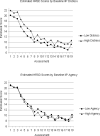Interpersonal problems as predictors of therapeutic alliance and symptom improvement in cognitive therapy for depression
- PMID: 22306232
- PMCID: PMC3306447
- DOI: 10.1016/j.jad.2011.12.044
Interpersonal problems as predictors of therapeutic alliance and symptom improvement in cognitive therapy for depression
Abstract
Background: The degree to which interpersonal problems of depressed patients improve over the course of cognitive therapy (CT) and relate to the quality of the therapeutic alliance and to symptom improvement, remains unclear.
Methods: We analyzed data of adult outpatients (N=523) with major depressive disorder participating in a clinical trial to determine the factor structure of the Inventory of Interpersonal Problems-Circumplex (IIP-C) and to relate the observed factor scores to the quality of the therapeutic alliance and symptom improvement over the course of CT. Patients received 16-20 sessions protocol (50-60 min each) of individual CT according to the treatment manual by Beck et al. (1979).
Results: We found a three-factor structure (interpersonal distress, agency, and communion) of interpersonal problems. Interpersonal distress decreased (d=.90), but interpersonal style did not change substantively during CT (communion d=.03; agency d=.14). High initial agency scores related negatively to the therapeutic alliance (β=-.12), whereas high initial communion scores related positively to the therapeutic alliance (β=.15). Elevated pre-treatment interpersonal distress scores were related to both weaker therapeutic alliances (β=.13) and higher symptom levels throughout treatment (β=.10).
Limitations: All patients in this study had recurrent MDD and it is therefore uncertain whether the results would generalize to patients with other psychiatric disorders.
Conclusions: This study supports the use of the IIP-C as a comprehensive measure of patients' interpersonal style and interpersonal distress. The IIP-C measured before CT showed some predictive validity with respect to therapeutic alliance measured at the midpoint and therapy outcome. The clinical importance of these findings is discussed.
Copyright © 2012 Elsevier B.V. All rights reserved.
Figures



References
-
- Alden LE, Capreol MJ. Avoidant personality disorder: Interpersonal problems as predictors of treatment response. Behavior Therapy. 1993;24:357–376.
-
- Alden LE, Wiggins JS, Pincus AL. Construction of Circumplex Scales for the Inventory of Interpersonal Problems. J. Pers. Assess. 1990;55:521–536. - PubMed
-
- Alexander LB, Luborsky L, Greenberg LS, Pinsof WM. The psychotherapeutic process: A research handbook. Guilford Press; New York, NY US: 1986. The Penn Helping Alliance Scales; pp. 325–366.
-
- American Psychiatric Association . Diagnostic and Statistical manual of mental disorders. 4th ed. American Psychiatric Press; Washington, D.C.: 1994.
-
- Bagby RM, Ryder AG, Schuller DR, Marshall MB. The Hamilton Depression Rating Scale: Has the Gold Standard Become a Lead Weight? Am. J. Psychiatry. 2004;161:2163–2177. - PubMed
Publication types
MeSH terms
Grants and funding
LinkOut - more resources
Full Text Sources
Medical

